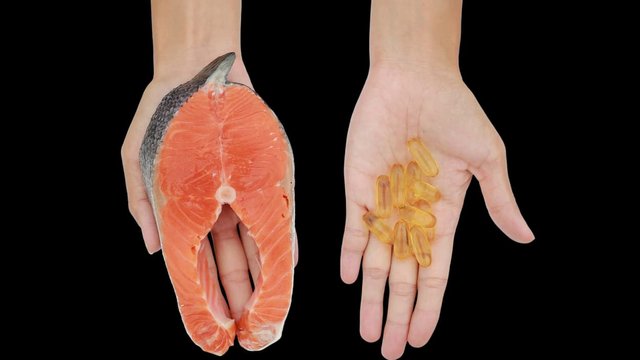Omega-3 supplements have no effect for cardiovascular health

Omega-3s are one of the most popular supplements in the dietary supplement industry. Almost everyone knows this name without necessarily knowing what is behind it. As part of the family of fatty acids (essential fatty acids), omega-3, seem to play a major role in the protection of the body as well as in development from childhood.
The human body can not manufacture omega-3, it is to food and dietary supplements that humans must rely. Although some plants (linseed oil, rapeseed oil, spinach, cabbage, ...) can bring this substance, to obtain the expected beneficial effects on health, it is mainly animal sources (canned sardines in oil, mackerel cooked, ...) who are privileged.
Among the effects of omega-3 reported by the manufacturers of food supplements, they reduce the risk of cardiovascular diseases (myocardial infarction, stroke, ...).
However, a study published on July 18, 2018 in Cochrane Database of Systematic Reviews confirms that omega-3 supplements have little or no benefit to cardiovascular health. Indeed, this new medical evidence challenges the belief that omega-3 supplements reduce the risk of heart disease, stroke, or death.

OMEGA-3: ALA, EPA, DHA
Small amounts of omega-3 fatty acids are essential for good health, and they are found in the foods we eat.
The main types of omega-3 fatty acids are: alpha-linolenic acid (ALA), eicosapentaenoic acid (EPA) and docosahexaenoic acid (DHA).
ALA is normally found in fats derived from plant foods, such as nuts and seeds - nuts and rapeseed are rich sources.
EPA and DHA, collectively known as long-chain omega-3 fatty acids, are naturally present in oily fish, such as salmon and fish oils, including cod liver oil.

BELIEF AROUND OMEGA-3 FOOD SUPPLEMENTS
The increased intake of omega-3 fatty acids is widely promoted around the world because of a common belief that it protects against heart disease.
There is more than one possible mechanism to help prevent heart disease, including lowering blood pressure or lowering cholesterol.
Omega-3 fatty acids are readily available as over-the-counter supplements and are widely purchased and used in many countries.
New data from meta-analysis shows little or no effect of omega-3 supplements on our risk of heart disease, stroke or death . The study brings together the results of seventy-nine randomized trials involving 112,059 individuals.
The researchers evaluated the effects of eating omega-3 as dietary supplements, compared to omega-3s in food, heart disease and circulation.
25 studies were deemed trustworthy by scientists because they were well designed and well conducted.

These studies recruited men and women from North America, Europe, Australia and Asia. Some participants were in good health and others with different diseases.
Participants were randomly assigned to increase their omega-3 levels or maintain their usual fat intake for at least one year.
Most studies have examined the impact of administering a long-chain omega-3 supplement in capsule form and compared it to a dummy pill (placebo). Only a few of the studies have evaluated the consumption of whole fish.

The researchers found that increasing long-chain omega-3s provides little or no benefit to most of the results they examined.
They found very clear evidence that long-chain omega-3 fatty acids had little or no significant effect on the risk of death, regardless of the cause.
The risk of death from any cause was 8.8% among those who increased their intake of omega-3 fatty acids, compared to 9% of those in the control groups.
They also found that taking more long-chain omega-3 fats (including EPA and DHA), primarily through dietary supplements, has little or no difference to the risk of cardiovascular events, coronary death, disease coronary heart disease, stroke or cardiac irregularities.

Long-chain omega-3 fatty acids have probably reduced some blood fats, triglycerides and HDL cholesterol. Reducing triglycerides is likely to protect against heart disease, but reducing HDL has the opposite effect. The researchers collected information on the adverse effects of the studies, but information on bleeding and blood clots was very limited.
The researchers suggest that eating more ALA through food or supplements probably has little or no effect on cardiovascular deaths or deaths from any cause. However, eating more ALA probably reduces the risk of heart irregularities from 3.3 to 2.6%.
The team found that reductions in cardiovascular events with ALA were so small that about 1,000 people would need to increase ALA consumption for one of them to benefit.
Similar results were found for cardiovascular death. They did not find enough data from the studies to be able to quantify the risk of bleeding or blood clots from using ALA.
Note that increasing omega-3 or ALA probably has no effect on body weight or overweight.

Finally, the authors indicate that "we can be confident in the results of this meta-analysis that goes against the popular belief that long-chain omega-3 supplements protect the heart. Despite all this information, we do not see any protective effects. Our study provides good evidence that taking long-chain omega-3 (fish oil, EPA or DHA) supplements does not benefit heart health or reduce the risk of stroke or death, in itself the cause. On the other hand, while oily fish is a healthy food, the small number of trials does not clearly indicate whether eating more oily fish truly protects the heart. "
Halting the biological mechanisms of cardiac senescence
In conclusion, this study found moderate evidence that ALA, found in vegetable oils (such as rapeseed or canola oil) and nuts, may be slightly protective of certain heart and circulatory diseases, but very limited.
Increasing intakes may be slightly beneficial for the prevention or treatment of cardiovascular diseases.
In order to prevent a person from prematurely dying from coronary heart disease or cardiovascular event, it seems especially important to take advantage of a balanced diet, a healthy lifestyle, with a practice of exercise regularly, in addition to regular follow-up with a health professional.
SOURCES
"Omega 3 fatty acids for the primary and secondary prevention of cardiovascular disease. ", Cochrane Database of Systematic Reviews, 2018, http://cochranelibrary-wiley.com/doi/10.1002/14651858.CD003177.pub3/abstract;jsessionid=8EA85638E6D8F5DE21A74419605F4C39.f01t04, DOI: 10.1002 / 14651858.CD003177.pub3